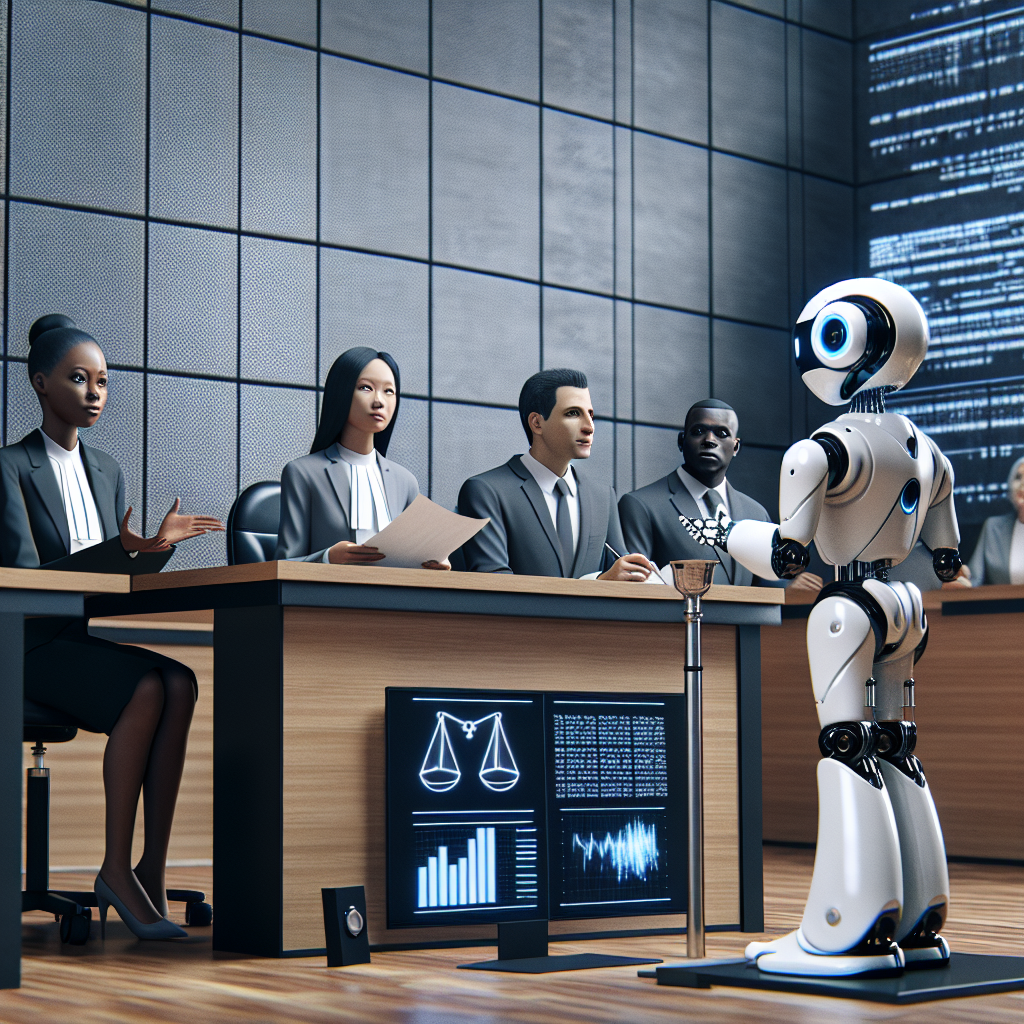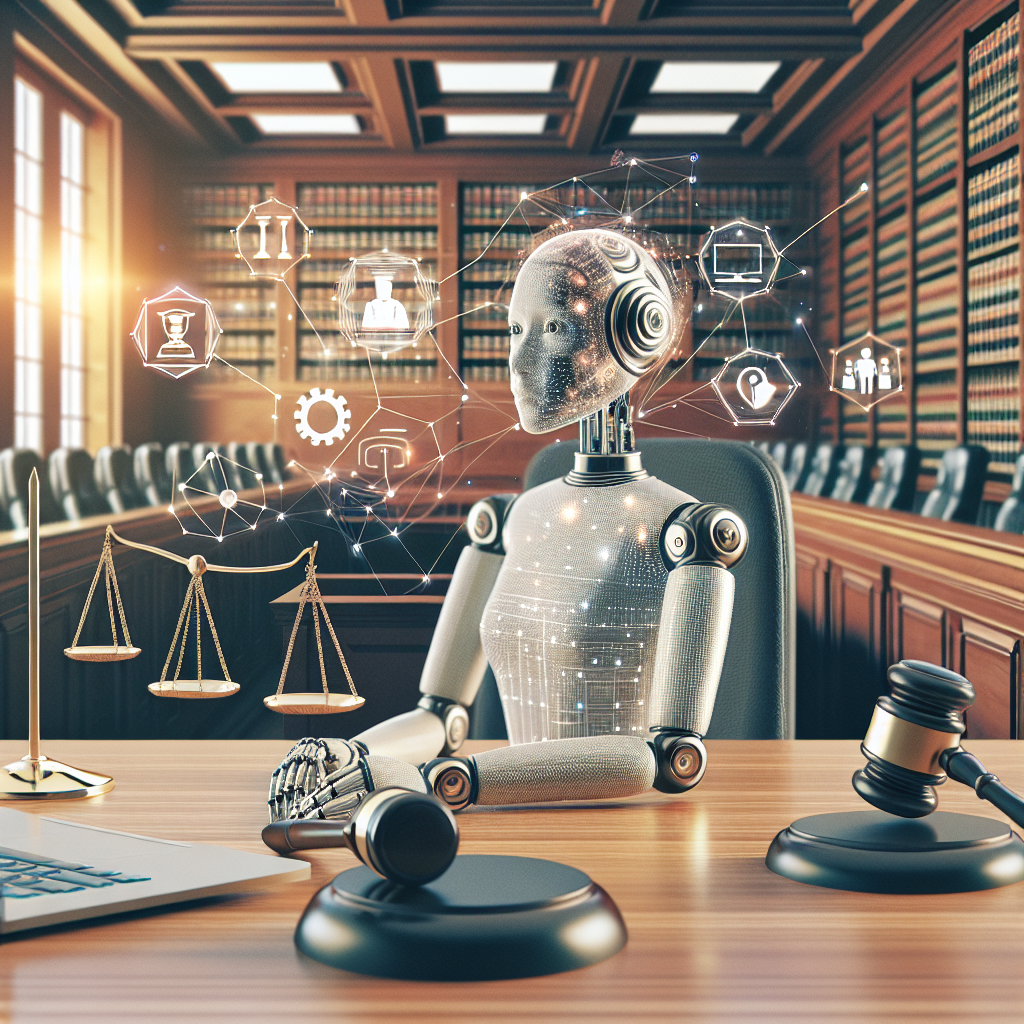The integration of artificial intelligence (AI) into the legal system is rapidly transforming courtroom dynamics. As technology advances, the implications of utilizing AI in legal proceedings raise essential questions about fairness, accountability, and the preservation of justice. Legal practitioners and technologists alike must grapple with the evolving landscape of AI applications in legal settings and their potential ramifications on traditional legal principles.
The Role of AI in Modern Courtrooms
AI tools are increasingly being employed in various facets of the legal process, from case management to predictive analytics. These technologies can assist in analyzing vast amounts of data, potentially leading to more informed decisions by legal professionals. However, the reliance on algorithms and machine learning raises concerns regarding bias and transparency. For instance, the multidistrict litigation challenges illustrate how complex legal cases can be influenced by AI systems that may not fully account for the nuances of individual cases.
Moreover, AI’s role in evidence gathering and analysis has sparked debates on its reliability and the ethical implications of its use. In some instances, AI systems have been shown to misinterpret data, leading to potential miscarriages of justice. As a result, courts must carefully consider the admissibility of AI-generated evidence and the standards that govern its evaluation. The increasing complexity of these issues demands a thorough examination of how AI intersects with established legal norms.
Legal Accountability and Ethical Considerations
The introduction of AI in courtrooms brings forth critical questions regarding legal accountability. When an AI system makes a decision that adversely affects a party, determining liability can become convoluted. Who is responsible when an AI misjudges evidence or provides biased outcomes? These scenarios necessitate a reevaluation of existing legal frameworks to accommodate the complexities introduced by AI technologies.
Furthermore, ethical considerations surrounding the use of AI in legal contexts cannot be overlooked. As AI systems become more prevalent, concerns regarding data privacy and the potential for discrimination intensify. Legal professionals must remain vigilant in ensuring that AI tools are used responsibly and that they do not perpetuate existing societal biases. The recent landmark court case emphasizes the need for transparency in AI applications, reinforcing the importance of ethical standards in the deployment of these technologies in legal settings.
In conclusion, the integration of AI into courtrooms presents both opportunities and challenges. As the legal community navigates this uncharted territory, ongoing dialogue and collaboration between technologists, legal scholars, and practitioners will be essential in shaping a legal framework that addresses the unique challenges posed by AI.
The integration of artificial intelligence (AI) into courtroom procedures presents a complex web of legal ramifications that must be navigated carefully. As AI technologies advance, they increasingly influence various aspects of the legal system, from evidence evaluation to jury selection. This evolving landscape raises critical questions regarding the implications of AI’s role in ensuring justice while also safeguarding fundamental rights.
AI and Evidence Evaluation in Court
One of the most significant areas where AI has made an impact is in the evaluation of evidence. AI systems can analyze vast amounts of data, identifying patterns and anomalies that might escape human scrutiny. However, the reliance on AI for evidence assessment can lead to challenges regarding reliability and fairness. For instance, the accuracy of predictive algorithms must be scrutinized to prevent potential biases from influencing judicial outcomes. The innovation and regulation of AI technologies are crucial to ensure that they enhance rather than undermine the integrity of the legal process.

Moreover, the admissibility of AI-generated evidence poses another layer of complexity. Courts must determine whether AI-derived insights can be considered reliable and relevant under existing legal standards. This situation necessitates a thorough examination of how AI algorithms function and the data sets they utilize. If a court determines that AI evidence is admissible, it still must consider whether jurors can adequately understand and weigh such evidence. Thus, the intersection of AI and evidence evaluation mandates a careful balancing act to maintain the principles of justice.
Ethical Considerations in AI Usage
The ethical implications of using AI in courtrooms extend beyond technical accuracy. The potential for AI to perpetuate existing biases is a significant concern, particularly in cases involving marginalized communities. If AI systems are trained on biased data, they may produce outcomes that unfairly disadvantage certain groups. Legal practitioners and policymakers must address these ethical dilemmas by establishing guidelines for the ethical use of AI in legal contexts. Ensuring transparency in AI algorithms is essential for fostering trust in judicial processes. The search and seizure privacy issues exemplify the need for clear regulations surrounding the use of AI tools in legal proceedings.
Furthermore, the role of AI in jury selection raises ethical questions regarding impartiality and fairness. Algorithms designed to predict juror biases may inadvertently reinforce stereotypes, leading to skewed jury compositions. Legal professionals must critically evaluate the implications of AI-driven jury selection processes to ensure that they uphold the right to a fair trial. It is imperative that the legal community actively engages in discussions surrounding the ethical deployment of AI technologies in courtrooms.
Future Implications of AI in Legal Frameworks
As AI continues to evolve, the legal frameworks governing its use in courtrooms must also adapt. Legislators are tasked with creating laws that not only address the current state of AI technologies but also anticipate future developments. This proactive approach will help mitigate potential legal challenges arising from unforeseen consequences of AI applications in the judicial system. The ongoing discussions about tort reform laws illustrate the necessity for legal frameworks to evolve alongside technological advancements.
Moreover, collaboration between technologists, legal experts, and ethicists is essential in shaping these frameworks. By working together, these stakeholders can develop comprehensive policies that ensure AI’s responsible use in legal contexts. The future of AI in courtrooms hinges on the ability to create a balanced regulatory environment that fosters innovation while protecting individual rights and the integrity of the judicial process.
The integration of artificial intelligence (AI) into courtroom proceedings is reshaping the legal landscape, raising numerous questions about accountability, fairness, and the implications of relying on technology in judicial matters. As AI systems become more prevalent, understanding the legal ramifications associated with their use is essential for both legal professionals and the public. This final segment delves into the consequences of AI implementation in courtrooms, highlighting the critical need for regulatory frameworks and ethical considerations.

Accountability in AI-Driven Decisions
One of the foremost concerns regarding AI in courtrooms is the issue of accountability. When AI algorithms are employed to assist in legal decisions, it becomes challenging to determine who is responsible for the outcomes produced by these systems. If an AI system provides a biased recommendation or erroneous analysis, the question arises: should the blame fall on the technology developers, the legal professionals who utilized it, or the judicial system as a whole? This ambiguity necessitates a thorough examination of liability and the establishment of clear guidelines to delineate accountability in AI-driven decisions.
Moreover, the reliance on AI raises significant ethical questions about the fairness of the legal process. If AI systems are trained on historical data that reflect societal biases, they may inadvertently perpetuate discrimination within the justice system. Thus, it is crucial to ensure that AI tools are designed with fairness in mind and that they undergo rigorous testing to mitigate potential biases. The legal community must advocate for transparency in AI algorithms to foster trust and maintain the integrity of judicial outcomes.
The Role of Regulatory Frameworks
As AI technologies continue to evolve, the legal framework surrounding their use in courtrooms must also adapt. Current laws may be insufficient to address the complexities introduced by AI, creating a pressing need for comprehensive regulations. Policymakers and legal experts must collaborate to formulate guidelines that govern the deployment of AI in judicial settings, ensuring that these technologies enhance rather than undermine the legal process.
Furthermore, the establishment of regulatory frameworks can help prevent misuse and abuse of AI technologies. By implementing standards for the development and application of AI in legal contexts, stakeholders can work towards safeguarding the rights of individuals while promoting the responsible use of technology. A proactive approach to regulation will not only protect the integrity of the legal system but also foster innovation in legal tech.
In conclusion, the legal ramifications of AI in courtrooms are profound and multifaceted. As AI becomes increasingly integrated into legal proceedings, it is vital for the legal community to engage in ongoing discussions about accountability and ethics. By prioritizing the development of robust regulatory frameworks, stakeholders can ensure that the deployment of AI enhances justice and upholds the principles of fairness and equality. For a deeper exploration of these issues, consider examining the legal ramifications of verdicts in recent cases, which illustrate the complexities of AI’s role in the justice system.